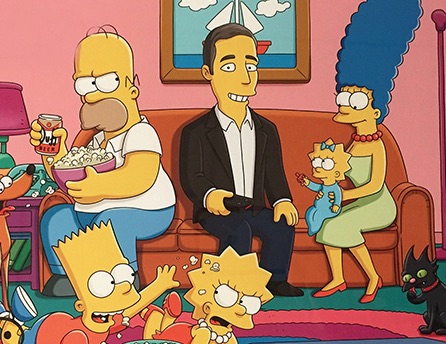The Five Spot: Steve MacDonald

The smarter way to stay on top of broadcasting and cable industry. Sign up below
You are now subscribed
Your newsletter sign-up was successful
One thing comes across loud and clear when you talk to Steve MacDonald: He genuinely loves the TV shows he sells. And he’s sold more than a few. As the exec in charge of selling off-network series to basic cable nets, he’s put together many of the richest deals in cable. He led the sale of The Simpsons to FXX for a reported $750 million, Modern Family to USA and Glee to Oxygen. He helped make FX’s It’s Always Sunny in Philadelphia the first cable original sold to another cable net (Comedy Central).
MacDonald’s other deals include Family Guy to Adult Swim; Bones to TNT; How I Met Your Mother to Lifetime; and Cops Reloaded to Spike.
Engineering a diverse deal portfolio has convinced MacDonald that cable nets are built on acquired product, even though originals get the buzz. An edited version of his chat with B&C’s Paige Albiniak follows:
How would you describe the current state of off-network sales to cable networks?
The market is still very active and strong in the sense that these networks can’t program all their own content 24 hours a day. Off-network content as a whole is pre-marketed and pre-branded. Audiences are already very aware of these shows. If you look at any of the top-performing cable networks, probably somewhere between 50% and 70% of their content is acquired. Our content is the unsung hero of cable networks. When you look at a house, you don’t talk about the foundation that holds it up, you talk about the paint, the windows, the decor. You don’t talk about the foundation. But if there wasn’t a foundation, there wouldn’t be a house.
How does that relate to the current environment in which originals are king?
Cable networks put all their time, energy and focus on their premiere content because that’s what drives their affiliate relationships and drives subscriptions. Cable operators feel they can’t drop networks such as AMC because viewers have to have The Walking Dead or FX because viewers have to have American Horror Story or Fargo. Original shows define networks, but acquired content helps expose the audience to those originals. By the time you get to 80 or 100 episodes, acquired shows have been tried and tested. On cable, we find that anywhere between 50% and 75% of that network’s audience hasn’t been introduced to these acquired shows. We call them reruns, but this puts them on new platforms that invite new people to come in.
The smarter way to stay on top of broadcasting and cable industry. Sign up below
What role would you say acquired movies are currently playing?
Look at most of the major entertainment networks: a large part of their schedules are movies. On average, 25% of Comedy Central’s schedule is movies. Movies rate incredibly well on basic cable compared to everything else, and people will watch their favorites again and again.
Do you think the future is about selling shows to multiple platforms?
It’s about the size and substance of a show—the stronger the show, the more places on which it can play. But distributing shows that way allows more content to be produced [because more money is being generated]. The fundamentals of monetization have changed, which is why there’s so much original content being produced. By and large, though, one of the healthiest returns that anyone can get is on acquired content. The successes far outweigh the failures.
Contributing editor Paige Albiniak has been covering the business of television for more than 25 years. She is a longtime contributor to Next TV, Broadcasting + Cable and Multichannel News. She concurrently serves as editorial director for The Global Entertainment Marketing Academy of Arts & Sciences (G.E.M.A.). She has written for such publications as TVNewsCheck, The New York Post, Variety, CBS Watch and more. Albiniak was B+C’s Los Angeles bureau chief from September 2002 to 2004, and an associate editor covering Congress and lobbying for the magazine in Washington, D.C., from January 1997 - September 2002.

